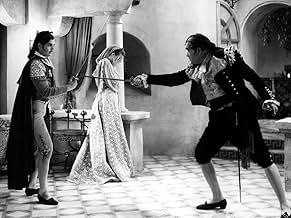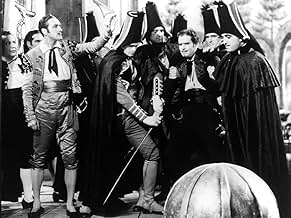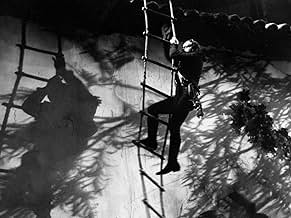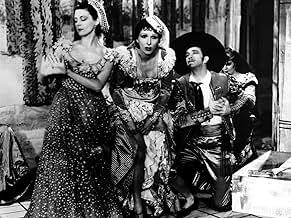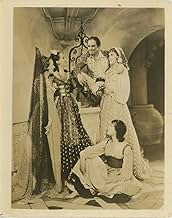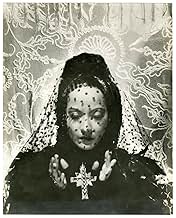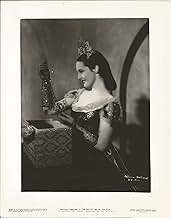La dernière aventure de Don Juan
Titre original : The Private Life of Don Juan
- 1934
- Tous publics
- 1h 29min
NOTE IMDb
6,3/10
825
MA NOTE
Devenu un homme marié, Don Juan coule des jours paisibles à Séville, sous une autre identité. Lorsqu'il apprend qu'un jeune homme tente de se faire passer pour lui, il est piqué au vif.Devenu un homme marié, Don Juan coule des jours paisibles à Séville, sous une autre identité. Lorsqu'il apprend qu'un jeune homme tente de se faire passer pour lui, il est piqué au vif.Devenu un homme marié, Don Juan coule des jours paisibles à Séville, sous une autre identité. Lorsqu'il apprend qu'un jeune homme tente de se faire passer pour lui, il est piqué au vif.
- Réalisation
- Scénario
- Casting principal
- Récompenses
- 1 victoire et 1 nomination au total
Barry MacKay
- Rodrigo The Impostor - A Man of Romance
- (as Barry Mackay)
Claud Allister
- The Duke - A Dukes Go
- (as Claude Allister)
Avis à la une
Don Juan, the great lover, is now middle-aged and finds he no longer has the same appeal with the ladies. Meanwhile a young impostor keeps the Don Juan legend alive by kissing women all over town. When trying to make a comeback, the real Don Juan can't live up to his own legend.
This is a very funny movie and an interesting take on the Don Juan character. We see him forced to adhere to a strict diet, as his good looks are "his only asset", and balcony-climbing has become a chore. It's a tale about aging and clutching to one's youth.
The cast is great for this witty Alexander Korda film. Young Merle Oberon is very beautiful as a dancer whose celebrity profits from being kissed by the great Don Juan. Benita Hume is lovely as the one woman who understands Don Juan - his wife. And it's a rare treat to see Douglas Fairbanks Sr. in a sound film, playing Don Juan in what would be his final role. The movie's a lot of fun, and even the opening credits are full of wit.
This is a very funny movie and an interesting take on the Don Juan character. We see him forced to adhere to a strict diet, as his good looks are "his only asset", and balcony-climbing has become a chore. It's a tale about aging and clutching to one's youth.
The cast is great for this witty Alexander Korda film. Young Merle Oberon is very beautiful as a dancer whose celebrity profits from being kissed by the great Don Juan. Benita Hume is lovely as the one woman who understands Don Juan - his wife. And it's a rare treat to see Douglas Fairbanks Sr. in a sound film, playing Don Juan in what would be his final role. The movie's a lot of fun, and even the opening credits are full of wit.
Returning old and in debt to Seville, the scene of his youthful triumphs, Douglas Fairbanks Snr as the Don finds a young impostor climbing less adroitly up balconies to get at the city's wives. When the inept lad is run through by a husband, Don Juan enjoys attending his own funeral but is persuaded by Melville Cooper, his sardonic sidekick Leporello, to disappear under an alias to Portugal.
Bored and unsuccessful with women there, he leaves when the even-older owner of the inn, Athene Seyler, proposes. Back in Seville, nobody believes that this strange elderly man is the dead Don Juan and he is universally taken for another impostor, even by old flames.
Among the host of lovely women it is invidious to pick out Merle Oberon as a gloriously seductive dancer Antonita, Benita Hume as his abandoned but still faithful wife Doña Dolores and Binnie Barnes as a gawky barmaid Rosita.
The whole film is tongue-in-cheek, with nobody taking themselves seriously and all acting with Latin extravagance. Picturesque costumes are about 1805, based on Goya's paintings, and there are some ambitious sets. Fine soundtrack throughout, with an opening serenade "Senorita Carmencita" and a running motif of "La Paloma". Good entertainment!
Bored and unsuccessful with women there, he leaves when the even-older owner of the inn, Athene Seyler, proposes. Back in Seville, nobody believes that this strange elderly man is the dead Don Juan and he is universally taken for another impostor, even by old flames.
Among the host of lovely women it is invidious to pick out Merle Oberon as a gloriously seductive dancer Antonita, Benita Hume as his abandoned but still faithful wife Doña Dolores and Binnie Barnes as a gawky barmaid Rosita.
The whole film is tongue-in-cheek, with nobody taking themselves seriously and all acting with Latin extravagance. Picturesque costumes are about 1805, based on Goya's paintings, and there are some ambitious sets. Fine soundtrack throughout, with an opening serenade "Senorita Carmencita" and a running motif of "La Paloma". Good entertainment!
Douglas Fairbanks, in his final role, stars as the legendary Spanish lover in his later years, when his legend has outgrow his reality. There is an epidemic of young men pretending to be Don Juan in order to woo lonely wives, and tales of Don Juan's past escapades have been published and are found on every street corner in Seville. But the real Don Juan has aches in his joints from too many years jumping off of balconies to escape jealous husbands, as well as lines on his face and gray in his hair. When one of the impostors is killed in a duel, Don Juan takes it as an opportunity to retire and move to the countryside under an assumed identity. But life as the world's greatest lover is hard to put away, and soon he begins to wish for his old glory.
This was a terrific send off for Fairbanks, as there are many parallels between his character and himself. His distinctly American voice may seem out of place, but I allowed for the discrepancy. He was still in tremendous shape, performing some climbing and jumping stunts, and a bit of swordplay. Oberon has rarely, if ever, been lovelier, and I got a kick out of Cooper as Don Juan's exasperated manservant. The costumes and sets are top notch, and director Alexander Korda keeps things moving along at a fine clip. A perfectly enjoyable romp, with some deeper things to say about the acceptance of aging, and the nature of reputation and legend.
This was a terrific send off for Fairbanks, as there are many parallels between his character and himself. His distinctly American voice may seem out of place, but I allowed for the discrepancy. He was still in tremendous shape, performing some climbing and jumping stunts, and a bit of swordplay. Oberon has rarely, if ever, been lovelier, and I got a kick out of Cooper as Don Juan's exasperated manservant. The costumes and sets are top notch, and director Alexander Korda keeps things moving along at a fine clip. A perfectly enjoyable romp, with some deeper things to say about the acceptance of aging, and the nature of reputation and legend.
"The Private Life of Don Juan" is a 1934 comedy from Alexander Korda and is notable as the swan song of screen legend Douglas Fairbanks. The Don Juan character comes from a 14th Century Spanish play, several books and plays (including works by Byron and Moliere) and the Mozart opera Don Giovanni (1787). The first film was in 1926 starring John Barrymore. Don Juan would be played later by Errol Flynn (1949) and Johnny Depp (1995).
Douglas Fairbanks Sr. was one of the biggest stars in the early years of Hollywood, referred to as "The King" of Hollywood. Along with Chaplin, DW Griffith, and Fairbank's wife, Mary Pickford, he founded United Artists (1919). He founded the Motion Picture Academy (1927) and was its first President, was the first to put his hands and feet in the cement at Grauman's Chinese Theatre, and hosted the first Oscar ceremony in 1929.
Fairbanks virtually invented the swashbuckler film and appeared in such classics as "The Three Musketeers" (1921), "Robin Hood" (1922), and "The Thief of Bagdad" (1924). He wasn't really known for his lothario roles, which were more the focus for his contemporaries Valentino and Barrymore.
Fairbanks was in England along with his son, looking for work, when he came upon Alexander Korda and hence this film. Korda loved film biographies - "The Private Life of Henry VIII" (1933), "The Private Life of Helen of Troy" (1927), "Rembrandt" (1936), "That Hamilton Woman" (1941), and "Bonnie Prince Charlie" (1948) – and while the character Don Juan is more fiction than fact, he was so well known it does take on an historical tone
Merle Oberon plays one of Fairbank's love interests. She started in films in 1928 but it was her role as Anne Boleyn opposite Charles Laughton in Korda's "The Private Life of Henry VIII" (1933) that brought her to stardom. She was nominated for an Oscar for "The Dark Angel" (1935) but is probably best remembered for her role as Cathy in "Wuthering Heights" (1938). Oberon appeared in several Korda films and eventually they married in 1939 and then divorced in 1945 when she married cinematographer Lucien Ballard.
Binnie Barnes plays a maid. Barnes was a major star of the 30s, appearing in "Private Life of Henry VIII" (1933), "Diamond Jim" (1935), "Last of the Mohicans" (1936) and "3 Musketeers" (1939). Her philosophy was - "I'm no Sarah Bernhardt. One picture is just like another to me as long as I don't have to be a sweet woman."
French born Georges Perinal (1897-1965) is the photographer. He worked often with Korda (Henry VIII, Rembrandt, Catherine the Great) and won an Oscar for "The Thief of Bagdad" (1940) and was nominated for "Four Feathers" (1939).
The NY Times called the film "a visually attractive costume comedy" but disliked Fairbanks' performance noting - "the microphone is ruthlessly unkind to him. Neither in voice nor theatrical skill is he gifted to read lines."
1934 was an OK year for films. The top box office slots went to "Viva Villa", "Cleopatra" and "The Barretts of Wimpole Street" and "It Happened One Night" was the big Oscar winner. That year "The Thin Man" series began, Karloff and Lugosi appeared in "The Black Cat", Fred Astaire and Ginger Rogers danced in "The Gay Divorcée", Laurel and Hardy laughed it up in "Babes in Toyland", and Howard Hawks' "Twentieth Century" came out.
The aging Fairbanks is marvelous as the aging lothario, and one can't help but make comparisons with John Wayne's "The Shootist" (1976), Edward G Robinson's "Soylent Green"(1973), Errol Flynn's "Too Much too Soon" (1958) or John Barrymore's "The Great Man Votes" (1939). Fairbanks is particularly good when philosophizing about the vagaries of fame and the problems of growing old.
This isn't the best film, but it is an opportunity to see the famous Douglas Fairbanks in a talkie and in a role that requires acting rather than swashbuckling alone. His voice is a bit disappointing and his acting skills are not terrific, though they are certainly acceptable. He is surprisingly agile as the 52 year old demonstrates throughout the film. Although his contemporaries were disappointed, the passage of time lets us evaluate him more appropriately.
Douglas Fairbanks Sr. was one of the biggest stars in the early years of Hollywood, referred to as "The King" of Hollywood. Along with Chaplin, DW Griffith, and Fairbank's wife, Mary Pickford, he founded United Artists (1919). He founded the Motion Picture Academy (1927) and was its first President, was the first to put his hands and feet in the cement at Grauman's Chinese Theatre, and hosted the first Oscar ceremony in 1929.
Fairbanks virtually invented the swashbuckler film and appeared in such classics as "The Three Musketeers" (1921), "Robin Hood" (1922), and "The Thief of Bagdad" (1924). He wasn't really known for his lothario roles, which were more the focus for his contemporaries Valentino and Barrymore.
Fairbanks was in England along with his son, looking for work, when he came upon Alexander Korda and hence this film. Korda loved film biographies - "The Private Life of Henry VIII" (1933), "The Private Life of Helen of Troy" (1927), "Rembrandt" (1936), "That Hamilton Woman" (1941), and "Bonnie Prince Charlie" (1948) – and while the character Don Juan is more fiction than fact, he was so well known it does take on an historical tone
Merle Oberon plays one of Fairbank's love interests. She started in films in 1928 but it was her role as Anne Boleyn opposite Charles Laughton in Korda's "The Private Life of Henry VIII" (1933) that brought her to stardom. She was nominated for an Oscar for "The Dark Angel" (1935) but is probably best remembered for her role as Cathy in "Wuthering Heights" (1938). Oberon appeared in several Korda films and eventually they married in 1939 and then divorced in 1945 when she married cinematographer Lucien Ballard.
Binnie Barnes plays a maid. Barnes was a major star of the 30s, appearing in "Private Life of Henry VIII" (1933), "Diamond Jim" (1935), "Last of the Mohicans" (1936) and "3 Musketeers" (1939). Her philosophy was - "I'm no Sarah Bernhardt. One picture is just like another to me as long as I don't have to be a sweet woman."
French born Georges Perinal (1897-1965) is the photographer. He worked often with Korda (Henry VIII, Rembrandt, Catherine the Great) and won an Oscar for "The Thief of Bagdad" (1940) and was nominated for "Four Feathers" (1939).
The NY Times called the film "a visually attractive costume comedy" but disliked Fairbanks' performance noting - "the microphone is ruthlessly unkind to him. Neither in voice nor theatrical skill is he gifted to read lines."
1934 was an OK year for films. The top box office slots went to "Viva Villa", "Cleopatra" and "The Barretts of Wimpole Street" and "It Happened One Night" was the big Oscar winner. That year "The Thin Man" series began, Karloff and Lugosi appeared in "The Black Cat", Fred Astaire and Ginger Rogers danced in "The Gay Divorcée", Laurel and Hardy laughed it up in "Babes in Toyland", and Howard Hawks' "Twentieth Century" came out.
The aging Fairbanks is marvelous as the aging lothario, and one can't help but make comparisons with John Wayne's "The Shootist" (1976), Edward G Robinson's "Soylent Green"(1973), Errol Flynn's "Too Much too Soon" (1958) or John Barrymore's "The Great Man Votes" (1939). Fairbanks is particularly good when philosophizing about the vagaries of fame and the problems of growing old.
This isn't the best film, but it is an opportunity to see the famous Douglas Fairbanks in a talkie and in a role that requires acting rather than swashbuckling alone. His voice is a bit disappointing and his acting skills are not terrific, though they are certainly acceptable. He is surprisingly agile as the 52 year old demonstrates throughout the film. Although his contemporaries were disappointed, the passage of time lets us evaluate him more appropriately.
This was at the twilight of Douglas Fairbanks's career and he gives a great performance both in comedy and adventure as Don Juan. He wasn't at the end of his career because he was too old or no longer popular in fact he just decided to call it a day while he was still very much a huge star and relatively young at barely over 50 years old. It's a great performance and a great way to say goodbye for Douglas Fairbanks. The movie is not the best but he is superb.
Le saviez-vous
- AnecdotesDon Juan was a real person named Miguel de Manara. In this movie, Douglas Fairbanks writes a note and signs it with that name.
- Crédits fousLengthy, humorous and accurate role descriptions are listed for each character in the opening credits.
- ConnexionsFeatured in Broken Flowers (2005)
- Bandes originalesThe Don Juan Serenade
(1934)
(Published in Great Britain with title "Senorita Carmencita")
Music by Mischa Spoliansky
Lyrics Arthur Wimperis
Performed by John Brownlee
Played as background music often
Meilleurs choix
Connectez-vous pour évaluer et suivre la liste de favoris afin de recevoir des recommandations personnalisées
- How long is The Private Life of Don Juan?Alimenté par Alexa
Détails
- Date de sortie
- Pays d’origine
- Site officiel
- Langue
- Aussi connu sous le nom de
- La vie privée de Don Juan
- Lieux de tournage
- Société de production
- Voir plus de crédits d'entreprise sur IMDbPro
- Durée1 heure 29 minutes
- Couleur
- Rapport de forme
- 1.37 : 1
Contribuer à cette page
Suggérer une modification ou ajouter du contenu manquant

Lacune principale
By what name was La dernière aventure de Don Juan (1934) officially released in India in English?
Répondre
